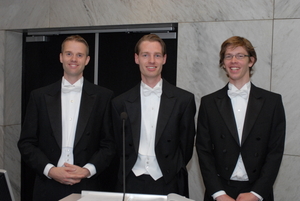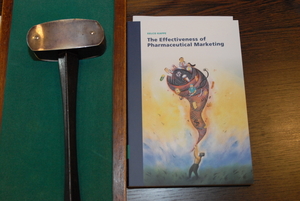The Effectiveness of Pharmaceutical Marketing
 Pharmaceutical marketing is a challenging and emerging topic in marketing. An in-depth study of marketing effectiveness is obtained through new and detailed data of firms’ marketing efforts towards their target market. To get valuable insights out of these data advanced econometric methods are required.
Pharmaceutical marketing is a challenging and emerging topic in marketing. An in-depth study of marketing effectiveness is obtained through new and detailed data of firms’ marketing efforts towards their target market. To get valuable insights out of these data advanced econometric methods are required.
In his dissertation entitled The Effectiveness of Pharmaceutical Marketing, Eelco Kappe provides empirical analyses and methods to contribute to several substantial problems on pharmaceutical marketing effectiveness. Using unique data in every essay, he studies the role of the firm, sales representative, and doctor in pharmaceutical marketing. The first essay evaluates the size of the sales force and the allocation of sales calls among doctors. In particular, it provides a method to gauge a yet-to-be-enacted firm-initiated policy shift. The second essay studies the effectiveness of the information content provided in sales calls. The main questions evolve around the discussion of positively biased drug information and the responsiveness of doctors to that. In the third essay, the sales success of products in science-based markets is investigated and specifically how scientific reviews influence sales and marketing expenditures to users and experts.
This dissertation has various important implications for managers and companies. One of the findings is that a drastic reduction of the sales force can give an important signal to the competition and increase profits of pharmaceutical companies. Another is that providing too much positive information to doctors in sales conversations decreases the effectiveness of pharmaceutical sales calls. Doctors prefer in the long term more balanced conversations that include both positive and negative information on the drugs.
Eelco Kappe defended his dissertation on June 24 2011 at Erasmus School of Economics, Erasmus University. His promoter was Prof.dr. S. Stremersch. Other members of the Doctoral Committee were Prof.dr. P.H.B.F. Franses, Prof.dr. J. Eliashberg, and Prof.dr.ir. B. Wierenga.
About Eelco Kappe
Eelco Kappe was born in 1984 in ‘s-Gravenhage, The Netherlands. In 2006, he completed his master’s degree in econometrics (major quantitative marketing) cum laude at the Erasmus University Rotterdam and started as a Ph.D. candidate in the marketing department at the Erasmus School of Economics. His dissertation involves the study of pharmaceutical marketing effectiveness and combines the usage of cutting-edge econometric methods with unique data sources. His research is characterized by a strong managerial focus combined with rigorous empirical analyses.
He has presented his work at several international conferences, such as the marketing science conference in Singapore, Vancouver, Detroit and Cologne and the marketing dynamics conference in New York. He visited various doctoral consortia among which the AMA doctoral consortium at Georgia State University in Atlanta. He also worked a few months on his research at Quintiles and in fall 2009 he visited IESE Business School in Barcelona. The studies resulting from his dissertation are currently under review at Management Science, Marketing Science, and the Journal of Marketing.
Eelco continues his career in academia and in August 2011 he will start as an assistant professor at the marketing department of Pennsylvania State University. Besides his academic work, Eelco is an active sportsman and likes to travel.
Abstract of The Effectiveness of Pharmaceutical Marketing
 Pharmaceutical marketing effectiveness comprises the measurement of marketing efforts of pharmaceutical firms towards doctors and patients. These firms spend billions of dollars yearly to promote their prescription drugs. This dissertation provides empirical analyses and methods to contribute to several substantial problems on pharmaceutical marketing effectiveness. Using unique data in every essay, it studies the role of the firm, sales rep and doctor in pharmaceutical marketing. The first essay evaluates the size of the sales force and the allocation of sales calls among doctors. In particular, it provides a method to gauge a yet-to-be-enacted firm-initiated policy shift. The second essay studies the effectiveness of the information content provided in sales calls. The main questions evolve around the discussion of positively biased drug information and the responsiveness of doctors to that. In the third essay, the interplay between drug sales, marketing and scientific reviews is studied in detail.
Pharmaceutical marketing effectiveness comprises the measurement of marketing efforts of pharmaceutical firms towards doctors and patients. These firms spend billions of dollars yearly to promote their prescription drugs. This dissertation provides empirical analyses and methods to contribute to several substantial problems on pharmaceutical marketing effectiveness. Using unique data in every essay, it studies the role of the firm, sales rep and doctor in pharmaceutical marketing. The first essay evaluates the size of the sales force and the allocation of sales calls among doctors. In particular, it provides a method to gauge a yet-to-be-enacted firm-initiated policy shift. The second essay studies the effectiveness of the information content provided in sales calls. The main questions evolve around the discussion of positively biased drug information and the responsiveness of doctors to that. In the third essay, the interplay between drug sales, marketing and scientific reviews is studied in detail.
The essays reveal important implications for academics and managers. For academics: (i) a new alternative to gauge policy shifts is offered; (ii) a model is offered to analyze the effectiveness of sales message content; and (iii) scientific reviews should be considered to correctly measure pharmaceutical marketing effectiveness. The implications for managers are: (i) the market leader is able to buck the trend in increasing sales forces; (ii) sales reps discuss positively biased information too often, which is counterproductive in the long run; and (iii) scientific reviews on products should be actively considered as a part of the marketing mix.
View photos of Eelco Kappe's defense
Download 'The Effectiveness of Pharmaceutical Marketing' at RePub


